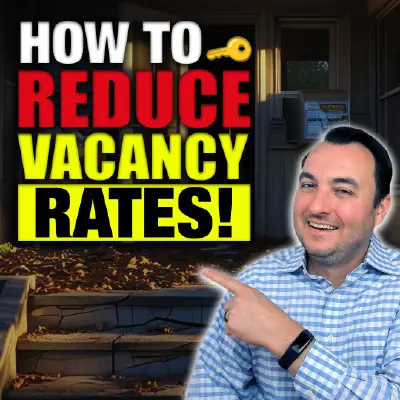Podcasts about Investing
Episodes about Investing

Jul 13, 2025
Episode 526: The Financial Physician July 13, 2025
"The Financial Physician" with Lou Scatigna, CFP ❭
How To Free Your Estate From ProbateThe Sorry State Of Education In AmericaThe DOJ Is Covering Up The Epstein Files, Bongino and Patel Threaten To ResignVile Democrats Cheer Death Of "Little White Girls" In Flood (Blame Trump)Comey and Brennan Under Investigation For Russia HoaxAnd Much More!!!

Is your rental unit sitting vacant longer than expected?
In this Strategy Saturday episode, Charles Carillo dives into the hidden costs of vacancy and shares the key strategies he uses to reduce downtime, increase lease renewals, and keep units filled. Whether you're managing a duplex, multifamily, or turnkey rental, you’ll learn how to avoid common marketing mistakes, improve tenant retention, and ultimately boost your NOI.
Charles covers everything from listing photos and tenant screening to early lease renewals and fraud prevention — plus he shares why most landlords lose money before the tenant ever moves in.
Mentioned Episodes:
SS74: What is the Difference Between Physical and Economic Vacancy - https://youtu.be/QDc-P15oRro
SS151: Understanding Vacancy and Make Ready Costs - https://youtu.be/AzpgO6yLTTM
SS230: Stop Wasting Money on Upgrades | Do These Instead for Higher Rents - https://youtu.be/2QwLnQNhZiM
Subscribe to never miss a weekly dose of real estate investing insights!
Connect with the Global Investors Show, Charles Carillo and Harborside Partners:
◾ Setup a FREE 30 Minute Strategy Call with Charles:
http://ScheduleCharles.com
◾ Learn How To Invest In Real Estate: https://www.SyndicationSuperstars.com/
◾ FREE Passive Investing Guide: http://www.HSPguide.com
◾ Join Our Weekly Email Newsletter: http://www.HSPsignup.com
◾ Passively Invest in Real Estate: http://www.InvestHSP.com
◾ Global Investors Web Page: http://GlobalInvestorsPodcast.com/

Jul 12, 2025
5 Costly Mistakes in Real Estate Investing (And Fixes!) w/ Ian Drewe
Real Estate Investing with the REI Mastermind Network ❭
Discover the 5 costly mistakes in real estate investing and how to avoid them! Learn from Ian Drewe, a seasoned real estate investor and multifamily expert, as he shares his journey from Australia to becoming a prominent name in U.S. real estate. From navigating multifamily assets to building an investment portfolio, Ian provides actionable strategies, lessons learned, and proven real estate investment strategies to help you create generational wealth.🚀 What You’ll Learn in This Episode:Common pitfalls in real estate investing and how to fix them.The importance of strategic renovations and building strong investor relationships.How data, technology, and AI are transforming deal sourcing and underwriting.Insights into multifamily properties, Section 8 housing, and the current market trends.Tips to grow and scale your investment portfolio while staying focused on the fundamentals.👥 Connect with Ian Drewe! Visit https://avocaproperty.com/ for more about his multifamily investment strategies and how his team is creating opportunities in Texas, Florida, Oklahoma, and South Carolina.🎧 Subscribe to the REI Mastermind Network PODCAST! Don’t miss out on Ian's incredible insights and other expert advice to take your real estate investing game to the next level.💡 "Relationships are everything. Maintain strong connections with your investors, and success will follow." – Ian Drew🔥 Support the show by sharing this episode with your investor friends, liking the video, and subscribing to the channel. Your engagement helps us bring you more transformative stories and expert advice!Unlock the secrets to building wealth through real estate investing. Hit that subscribe button and join a community dedicated to creating generational wealth through smart investment strategies!#realestaterookie #housingmarket #duediligence #multifamilydemand #interestratesCHAPTERS:00:00 - Intro00:16 - Real Estate Journey02:52 - Current Focus in Real Estate04:57 - Emerging Trends in Real Estate08:00 - Data and Technology in Business12:12 - Jackson Place Overview17:49 - Avoiding Digital Marketing Pitfalls19:11 - Choosing the Right Mastermind Group20:14 - Understanding Bait and Switch Tactics23:21 - Future Plans for Ian25:45 - Missed Topics of Discussion26:18 - Personal Lies and Self-Reflection26:36 - Advice to Younger Self26:54 - Recommended Reading27:18 - Time-Saving Tools in Real EstateRealDealCrew.comWe empower real estate investors by optimizing your business processes through customized automation and system integration. From lead management to deal closure, we help you build a scalable and efficient operation. Learn more at RealDealCrew.comLIKE • SHARE • JOIN • REVIEWWebsiteApple PodcastsYouTubeYouTube Music

Jul 11, 2025
07-10-2025 - Product Call - Master the Basics, Close More Sales with Stephen Davies
The Alliance U PRODcast ❭
Join Stephen Davies on Today's Product Call as he breaks down the basic principles that drive successful sales—the same fundamentals he’s used to build a powerhouse business. Whether you’re new to the game or looking to get back on track, this is the kind of back-to-basics training that makes a real difference in your results. Don’t miss it!

Today's Post - https://bahnsen.co/44Cuq1w
Analyzing the One Big Beautiful Bill Act: Tax and Spending Implications
In this week's Dividend Cafe, David delves into the 'One Big Beautiful Bill Act,' an omnibus tax and spending bill recently signed into law. The episode covers its investment and market ramifications, debunks myths surrounding the bill, and offers both praise and criticism for its various provisions. The discussion emphasizes the bill's five major components: the extension of prior tax cuts, new campaign tax changes, pro-growth business tax changes, spending cuts, and an increase in the debt ceiling. David provides an objective analysis while acknowledging his personal political biases, stressing the importance of a non-uniform approach to investing and policy assessment. Additionally, the episode underscores the negative and positive impacts of the bill on different economic sectors, with a particular focus on its long-term fiscal implications.
00:00 Introduction to the One Big Beautiful Bill Act
01:35 The Political Landscape and Personal Views
05:50 Breaking Down the Bill: Five Major Categories
12:23 Debunking Myths About the Bill
19:43 Pro-Growth and Non-Growth Elements
28:53 Final Thoughts and Market Implications
Links mentioned in this episode:
DividendCafe.com
TheBahnsenGroup.com

📈 Are you on track with the Baby Steps? Get a free personalized plan.
Do you ever feel like being a mom has taken over your whole life? In this episode, you’ll learn four powerful truths every mom needs to hear when you feel like you’re getting it wrong.
Next Steps:
🎥 Watch my video Classroom Parent vs. Venmo Parent? (Settling the Debate).
💵 The simplest way to budget. Download the EveryDollar app for free!
Connect With Our Sponsors:
Learn more about Christian Healthcare Ministries.
Get 20% off when you join DeleteMe.
Explore More From Ramsey Network:
🍸 Smart Money Happy Hour
🎙️ The Ramsey Show
💸 The Ramsey Show Highlights
🧠 The Dr. John Delony Show
💰 George Kamel
🪑 Front Row Seat with Ken Coleman
📈 EntreLeadership
Ramsey Solutions Privacy Policy
Learn more about your ad choices. Visit megaphone.fm/adchoices

Jul 11, 2025
20Growth: The Death of Growth Teams? | How Hubspot Use AI to Triple Email Conversion | The Future of AI SEO | Why Prompt Engineering is the New Coding | What Every CMO Needs to Know About AI in 2025
The Twenty Minute VC (20VC): Venture Capital | Startup Funding | The Pitch ❭
Kieran Flanagan is the CMO at HubSpot, where he’s led the transformation of their growth strategy from SEO-led to multi-channel and AI-powered. Formerly SVP of Marketing, he helped scale HubSpot’s user base to millions and revenue past $2B. Before HubSpot, he drove breakout growth at Marketo and Salesforce. Kieran is one of the most respected voices in SaaS marketing and a pioneer in growth-driven content strategy. Agenda: 00:03 – The Death of Growth Teams? Kieran's Wild Prediction 06:44 – AI Innovation Pods: The New Org Structure for Startups 10:18 – Email Personalization That Tripled Conversions 13:21 – From Software Budget to Labor Budget: The Shift is Happening 16:35 – The Big Lie: Why Autonomous Agents Still Suck 19:24 – The Secret Sauce Behind HubSpot’s Email AI Stack 21:44 – Segment-Based Marketing Is Dead. Enter Micro Audiences. 24:15 – Content Collapse: Why Google Organic Is Getting Torched 30:52 – The Future of AI SEO: 1 Product, 100 Pages, Infinite Prompts 33:16 – Memory = Moat: Why ChatGPT Is Becoming Unbeatable 35:46 – Prompt Engineering is the New Coding: Here's How to Win 41:03 – The Death of the Middle Manager Marketer 46:17 – OpenAI vs. Anthropic: Kieran’s $400M Bet 48:00 – Europe Is Falling Behind: The Harsh Truth on Regulation 52:39 – CMO Playbook 2025: Micro-Audiences, Creator-Led, AI at Scale

Key Takeaways:
The balance sheet: A important financial document that details what a company owns and owes, providing insights into its financial health.
Keeping assets greater than liabilities: Essential for maintaining positive equity and reducing debt.
Positive equity: Indicates a strong financial position, bolstering confidence among investors and lenders.
Utilizing technology and strategic innovations: Can empower businesses to increase their productivity and margins.
Avoiding unnecessary debt and ensuring profitable business activities: Are key to building long-term financial strength.
Chapters:
Timestamp Summary
0:00 Understanding the Importance of Balance Sheets for Businesses
2:04 Understanding Balance Sheets for Business Financial Health
4:14 Understanding Business Equity and Its Impact on Financial Health
8:04 Leveraging Technology for Business Efficiency and Growth
9:44 Building a Strong Balance Sheet for Financial Success
Powered by ReiffMartin CPA and Stone Hill Wealth Management
Social Media Handles
Follow Phillip Washington, Jr. on Instagram (@askphillip)
Subscribe to Wealth Building Made Simple newsletter
https://www.wealthbuildingmadesimple.us/
Ready to turn your investing dreams into reality? Our "Wealth Building Made Simple" premium newsletter is your secret weapon. We break down investing in a way that's easy to understand, even if you're just starting out. Learn the tricks the wealthy use, discover exciting opportunities, and start building the future YOU want. Sign up now, and let's make those dreams happen!
WBMS Premium Subscription
Phillip Washington, Jr. is a registered investment adviser. Information presented is for educational purposes only and does not intend to make an offer or solicitation for the sale or purchase of any specific securities, investments, or investment strategies. Investments involve risk and, unless otherwise stated, are not guaranteed. Be sure to first consult with a qualified financial adviser and/or tax professional before implementing any strategy discussed herein. Past performance is not indicative of future performance.

💵 Sign up for EveryDollar today - Create a free Budget!
Listen to how ordinary people built extraordinary wealth - and how you can, too. You’ll learn how millionaires live on less than they make, avoid debt, invest, and are disciplined and responsible!
Next Steps:
💰Need help with your investments? Connect with a SmartVestor Pro: (SmartVestor Investing Professionals) #PaidEndorsement
📝Get your free copy of Ramsey’s Complete Guide to Investing: (Ramsey's Complete Guide to Investing)
🏦Take a retirement assessment to find out how much you’ll need to retire: (Retire Inspired with the R:IQ Retirement Assessment)
📈See how much your investments could be worth over time with this handy calculator: (Investment Calculator)
🧑💻Explore free investing tools, articles and more on the Ramsey Investing Hub: (Ramsey Investing Tools and Resources)
Listen to more from Ramsey Network
🎙️ The Ramsey Show
🧠 The Dr. John Delony Show
🍸 Smart Money Happy Hour
💡 The Rachel Cruze Show
💰 George Kamel
🪑 Front Row Seat with Ken Coleman
📈 EntreLeadership
💸 The Ramsey Show Highlights
Learn more about your ad choices.
Ramsey Solutions Privacy Policy

Jul 11, 2025
Sponsorship and Manchester United: conversations with Qualcomm CMO Don McGuire and Utd Chief Business Officer Marc Armstrong
Leaders Sport Business Podcast ❭
Manchester United have remained a market leading force in commercial activity despite a run of challenging seasons for onfield performance and results. Current front-of-shirt partner Snapdragon, a mobile phone chip manufacturing brand within the Qualcomm software empire, is entering the second year of a five-year deal worth a reported $375 million. It's a top-end fee for a position at a club that finished 15th last season. On the show this week, Qualcomm CMO Don McGuire and newly installed Manchester United Chief Business Officer Marc Armstrong join James Emmett to talk about how to make commercial and marketing impact through a challenging era of transition.

